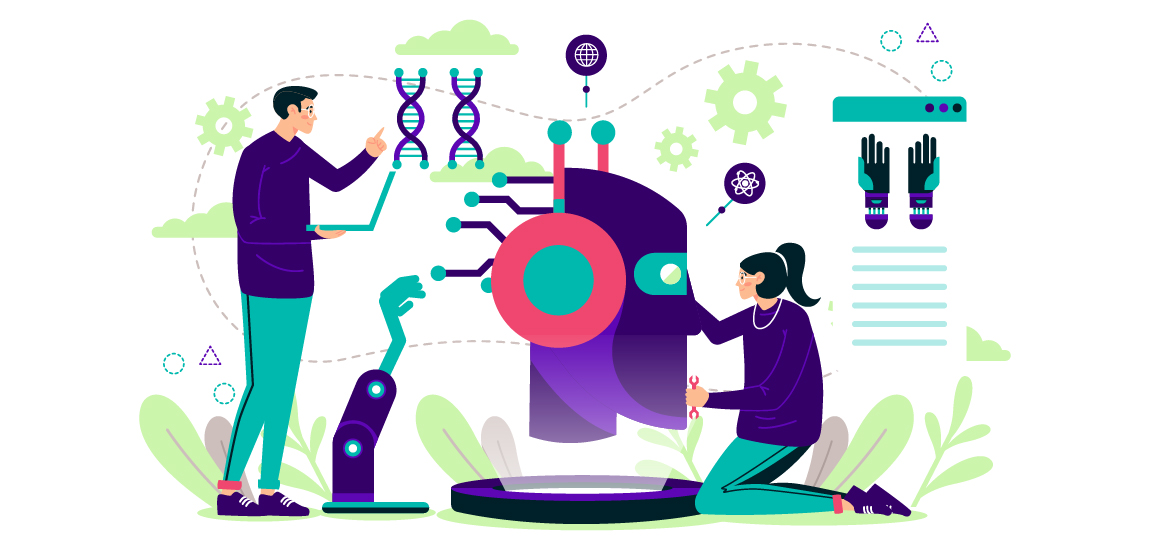
The Impact Of Machine Learning On Translation Industry
The translation industry has witnessed a significant transformation in recent years, thanks to the advent of artificial intelligence in language translation. Machine learning, a subset of artificial intelligence, has played a pivotal role in this evolution. This article explores the profound effect of AI, especially neural machine translation, on the translation industry, the role of human translators, and the future of language services.
The Evolution of Translation Technology
In the past, translation relied heavily on human intervention, as professional translators meticulously translated text from one language to another. This process was time-consuming and expensive, and the quality of translations often varied widely due to language barriers and the complexity of idiomatic expressions.
However, with the rise of AI and machine learning, we have witnessed a shift towards more accurate translations. Neural machine translation, a powerful technology within the field of natural language processing, has revolutionized the translation industry. It uses machine learning algorithms to improve the translation quality, making it possible to translate a wide range of content with impressive accuracy.
The evolution of translation technology has revolutionized the translation process, enhancing the user experience and the quality of translation across diverse language pairs. Through deep learning and the integration of linguistic rules, computer-assisted translation has become a valuable tool for language service providers, enabling precise translations and efficient translation workflows. This technological advancement has not only streamlined the translation process but has also improved the accuracy and consistency of translations, making it a valuable asset in today’s globalized world.


Types of Machine Translation
Machine translation can be categorized into several types, each with its unique approach and use cases. These include:
- Statistical Machine Translation: This approach relies on statistical models to make translations. It uses patterns and statistical data to generate translations.
- Rule-Based Machine Translation: In this approach, translation rules and grammatical structures are predefined. While effective for some content, it may struggle with idiomatic expressions.
- Neural Machine Translation: This is the most advanced form of machine translation, using neural networks to learn and improve translations. It can provide high-quality translations for a wide variety of content.
Benefits of Machine Translation
- The impact of machine learning on the translation industry has brought several significant benefits:
- Improved Quality: Machine translation technologies, especially neural machine translation engines, have significantly improved the quality of machine translations. They can handle a wide range of content, from everyday conversations to specialized fields like legal documents.
- Real-time Translations: AI-powered translation tools offer real-time translation, making communication across languages more efficient and accessible.
- Cost-Effectiveness: Machine translation is cost-effective, especially for user-generated content or large-scale translation projects. It reduces the dependence on professional human translators.
- Translation Memory: Machine translation systems can store and recall previous translations, building a Translation Memory that ensures consistency in translated content.

The Role of Human Translators
While machine translation has undoubtedly impacted the translation industry, human translation still plays a crucial role. AI and machine translation tools, while impressive, may not always capture the nuances of a language as effectively as a native speaker. Human translators can offer valuable insights, cultural context, and ensure that translations are reliable and accurate, especially for high-stakes content.

The Future of Language Services
As the demand for translation services continues to grow, the field of translation is evolving. The language services industry is increasingly integrating AI-generated translations alongside human involvement. This combination offers a balance between speed and accuracy, meeting the diverse needs of clients.
Translation Methods and Tools Comparison
Human translations involve the meticulous conversion of text from a source language to a target language by skilled linguists, ensuring nuance and context are accurately conveyed. In contrast, statistical machine translation relies on algorithms and data analysis to automate the process of translating text between languages. While automatic translations can provide quick results, they often struggle with idiomatic expressions and cultural nuances present in the source sentence, highlighting the value of human expertise in achieving precise and meaningful translations.
CAT tools, such as SDL Trados and memoQ, assist translators in managing and optimizing their translation workflow by leveraging translation memories and terminology databases. These tools integrate linguistic rules to enhance accuracy and consistency across translations. In the field of machine translation, services like Google Translate and DeepL provide automated translation solutions using neural networks and algorithms. Machine translation software continues to evolve, bridging language barriers more effectively with advancements in natural language processing and artificial intelligence.
Conclusion
The impact of machine learning on the translation industry is undeniable. AI and machine translation technologies have significantly improved the quality and accuracy of translation, offering efficient and cost-effective solutions for a wide range of content. While human translators continue to provide indispensable expertise, the future of translation services lies in the symbiotic relationship between human intelligence and AI, ensuring that language barriers are no longer insurmountable obstacles in our increasingly connected world. Translation companies that embrace AI are better positioned to provide high-quality and reliable translations in the evolving landscape of global communication.
Translation Methods and Tools Comparison
Human translations involve the meticulous conversion of text from a source language to a target language by skilled linguists, ensuring nuance and context are accurately conveyed. In contrast, statistical machine translation relies on algorithms and data analysis to automate the process of translating text between languages. While automatic translations can provide quick results, they often struggle with idiomatic expressions and cultural nuances present in the source sentence, highlighting the value of human expertise in achieving precise and meaningful translations.
CAT tools, such as SDL Trados and memoQ, assist translators in managing and optimizing their translation workflow by leveraging translation memories and terminology databases. These tools integrate linguistic rules to enhance accuracy and consistency across translations. In the field of machine translation, services like Google Translate and DeepL provide automated translation solutions using neural networks and algorithms. Machine translation software continues to evolve, bridging language barriers more effectively with advancements in natural language processing and artificial intelligence.
FREQUENTLY ASKED QUESTIONS
Why is Spanish in high demand for professional translation services?
Spanish is widely spoken in North and South America, and many Latin American countries have it as their official language. This makes it crucial for businesses to communicate effectively with their target markets, and professional translation services for Spanish are in high demand due to this wide reach.
What role does English play in the translation industry?
English is the most widely spoken language globally, and many international businesses require translations for various purposes, from legal to medical documents. Companies in English-speaking countries often need professional translation services to engage with a global audience effectively.
Why is German translation in demand for businesses?
Germany’s economic influence has made German translations essential for companies looking to penetrate the German-speaking market. Professional translation agencies are often sought after for their expertise in German language translations.
How important is Russian in international business?
Russian is vital for businesses expanding into Eastern Europe and beyond. Technical and business documents often require translation into Russian for effective communication. Professional translation services are instrumental in this regard.
Why is Japanese a valuable language in the business world?
Japan’s status as a global economic powerhouse makes Japanese an important language for international business. Companies seeking to enter the Japanese market rely on professional translation services for accurate and culturally sensitive communication.


Sorry, the comment form is closed at this time.